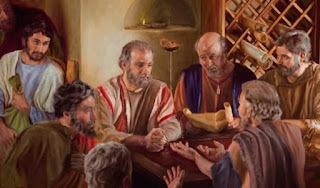St. Barnabas 26. Dealing with a Difficult Question.
We saw last week that certain Jewish
Christians had insisted that Gentile Christians had to follow the ceremonial
laws of Judaism for salvation. St. Paul wrote his Letter to the Galatians –
that is, to all the believers in the churches that he and St. Barnabas had
formed on their recent missionary journey – to re-assert that salvation,
“justification,” is solely based on faith in Jesus Christ. The letter was
likely written early in 49 AD, perhaps not even a year after their return.
Paul’s passion expressed in this letter is
brought out clearly in J. B. Phillip’s 1958 translation:
“O you dear idiots of Galatia, who saw
Jesus Christ the Crucified so plainly, who has been casting a spell over you? I
shall ask you one simple question: Did you receive the Spirit by trying to keep
the Law or by believing the message of the Gospel? Surely you can’t be so idiotic
as to think that a man begins his spiritual life in the Spirit and then
completes it by reverting to outward observances? Has all your painful
experience brought you nowhere? I simply cannot believe it of you! Does God,
who gives you his Spirit and works miracles among you, do these things because
you have obeyed the Law or because you have believed the Gospel? Ask yourselves
that.” (Gal 3:1-5).
We chuckle at the translation, and admire
Paul’s driving passion. We also recall all we learned about Barnabas’ and
Paul’s journey – their preaching and conversions, their trials and
persecutions, and their sufferings. Now we see there was more to the story: the
believers themselves underwent their own “painful experiences,” no doubt from
similar persecutions and sufferings. We also learn that they witnessed many
miracles, likely at the hands of Paul and Barnabas, but just as likely from
others as well, all through the Holy Spirit. The Spirit was so tangibly given
to the believers that they know with a certainty that the Holy Spirit dwelt
within and among them. So Paul is not only referring to salvation “from”
sin, but also salvation “for” life in Christ by the Holy Spirit. (See
the small book, “Salvation,” by Dr. Michael Patrick Barber, and easy and
enlightening read.)
Paul also says those brethren in Galatia
“saw Jesus Christ the Crucified so plainly.” Was he merely speaking in an
analogy of the Gospel message of Christ’s passion and death? Or perhaps “saw”
is more literal. Perhaps some vision, but probably more likely their visibly
seeing the sufferings of Paul, Barnabas, other believers, each bearing visible
wounds in their flesh for the sake of Christ. Paul also hints at something like
this when he writes at the end of his letter, “I bear on my body the marks of Jesus”
(Gal 6:17). Those first Christians would have actually seen whatever he was
referring to.
The next event in Barnabas’ life that we know of is that by about April that year (49 AD), he and Paul were in Jerusalem. Let’s do some reasonable speculation about how this might possibly have come about. The so-called “Judaizers” had swayed Peter and had begun to sway Barnabas. Paul forcefully spoke up. The three had many discussions on the difficult question of Christian belief and Jewish Law, particularly ceremonial law. Then brethren came from the Galatian area informing them that the same issue was dividing the churches in Galatia. Peter, Barnabas, and Paul conferred and decided a letter would be best. Paul was the main author (Gal 1:1) but perhaps they all contributed some thoughts (Gal 1:2). At the same time they probably realized that this issue will undoubtedly be a problem in Judea and everywhere. Perhaps it was Peter who spoke up and said that all the Apostles needed to meet and decide how to deal with it. Imagine Peter saying, “The roads are clearing from the Winter storms. I’ll go down to Jerusalem now and send messages to all the Apostles to gather in the Spring. You both come in Spring. We will all fast and pray for the guidance of the Holy Spirit.”
Our Lady of Lourdes Catholic Church is located in California City, CA. Visit our website at ollcalcity.org.
Dibby Allan Green has a BA in Religious Studies (Westmont College, 1978) and MA in Theology (Augustine Institute, 2019), is a lay Catholic hermit, and a parishioner of Our Lady of Lourdes Parish.

